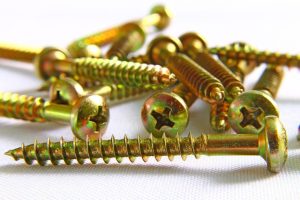
Screws are one of the most popular types of fasteners. Consisting of a threaded body or “shank” with a pointed tip, they are used to hold two or more objects together. Driving a screw through a set of objects will pull them together.
Screws, however, may come loose. When this occurs, they will only offer a secure hold, resulting in the separation of the objects. Why do screws come loose exactly?
Under-Tightening
Under-tightening can cause screws to come loose. You need to tighten screws enough so that they apply sufficient clamping force. Without sufficient clamping force, they won’t be able to hold the objects together. This loose fit will allow the objects to move, which can cause the screws to loosen over time.
Over-Tightening
In addition to under-tightening, over-tightening can cause screws to come loose. Over-tightening involves the application of too much turning power or torque. When you over-tighten a screw, you may inadvertently damage its threads. The threads, of course, provide holding power. If they are damaged, the screw will have more “play” and may come loose.
Thermal Expansion and Contraction
Thermal expansion and contraction can cause screws to come loose. Thermal expansion and contraction is completely normal. Heat causes objects to expand, whereas coldness causes them to contract. If the objects expand and contract at different rates, however, the screw or screws holding them together may come loose.
Vibrations
Another common reason screws come loose is vibrations. Screws rely on their threads to hold objects together. When exposed to vibrations, screws may gradually work their way out of the hole created by their threads. A simple solution to protect screws from vibration-related loosening, though, is to use a locking washer or locking nut.
Corrosion
Screws can loosen due to corrosion. Most screws are made of metal. When exposed to moisture — even just airborne moisture in the form of humidity — they can corrode. Corrosion is a chemical reaction that causes the metal to deteriorate. Eventually, screws can become so corroded that they become loose or even break. Fortunately, the right finish, such as zinc, can help protect screws from corrosion.
Weight and Pressure Shifts
Finally, shifts in weight or pressure can cause screws to come loose. Screws used in construction and machinery-related applications are susceptible to this phenomenon. When the objects’ weight or pressure shifts, the screws holding it together may move. These slight movements can cause screws to loosen over time.
